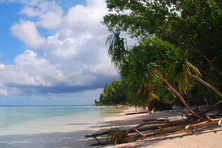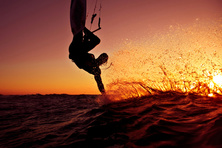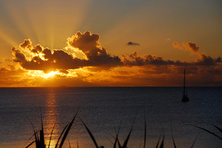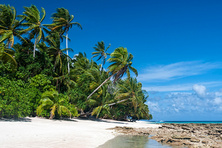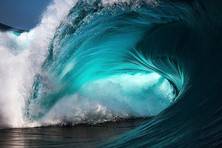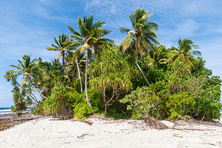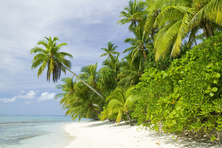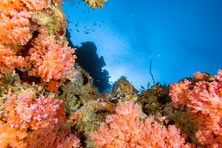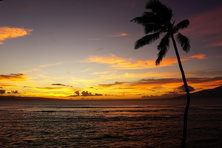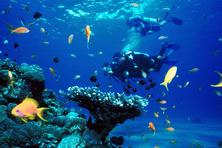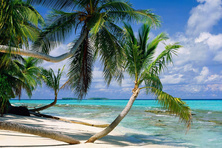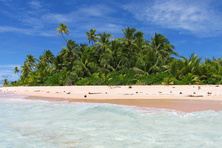Tuvalu
- Currency: Tuvaluan dollar
- Time: UTC+12
- Languages: Tuvaluan, English
- Religions: Christianity (Protestantism)
- Sections: Get in Visa Customs Cuisine Money Details of interest Popular resorts
Tuvalu is an island state in the Pacific Ocean consisting of eight islands and forming 9 coral atolls. The capital city is Funafuti.
The climate in Tuvalu is maritime equatorial. The average annual temperature is +29°C. The best time for travelling to the islands is the period from May to September when the weather is warm and dry.
English and Tuvalu are the official languages. The locals speak 7 dialects, including Polynesian and Micronesian.
Tuvalu is often called a “paradise on the Earth” but unfortunately, tourism is not well-developed here. The travellers usually prefer to come to the Nui Atoll with its clean sandy beaches and a unique underwater world. This island is ideal for snorkelling, surfing, windsurfing, and diving.
There are good beaches on the Nanumanga Island, in Funafuti, and Vaitupu. The Nui Atoll and the Nukufetau Atoll are good for kitesurfing.
Those who are interested in the Second World War should visit Funafuti, which was the first-line of defence of the US Naval Establishment.
The Nukulaelae Atoll is known as the only pre-Christian ceremonial place in Tuvalu. The scientists still debate who placed the ancient altar stone on the Nukulaelae.
The only deep-water lagoon is the central lagoon on the Nukufetau Atoll. Palm groves and exotic landscape make this coral atoll an ideal place for private and quiet holidays.
Get in
There are no direct flights from CIS and EU countries to Tuvalu. The only way to get there is a transit flight with a transfer in Hong Kong, Seoul or Sydney. It will take you about two days to get to Tuvalu.
Visa
The citizens of CIS and Europe can travel to Tuvalu visa-free. On arrival, a permit is given which allows the travellers stay on the islands for 35 days.
For additional cost, anyone can extend his or her stay in Tuvalu for three months.
Customs
The Customs legislation of Tuvalu does not restrict the import and export of currency. However, any money must be declared.
The following things should also be declared:
- photo and video cameras;
- binoculars;
- tape recorder, radio set, player;
- typing machine and portable computers;
- sports equipment.
It is prohibited to import food. Imported seeds, plants, wooden goods and materials of animal origin are subject to Customs inspections.
It is prohibited to export from Tuvalu:
- plants and animals under state protection;
- things made of corals, seashells, bones, skins and birds’ feathers.
Cuisine
Tuvalu is not only one of the most beautiful “coral states” on the island, but it is known for its cuisine which will surely delight all the foodies.
The staple food is pork and seafood (salmon, crabs, turtles, and sole). Of course, virtually no dish is prepared without coconuts. Coconut is a “king of Tuvalu”. It is used in desserts, sauces, and even soups. Breadfruit, pulaka, and bananas are the ingredients for many traditional dishes.
Meat lovers should try smoked ham with spices, duck roasted with coconut, and chicken stewed in coconut water. A hallmark dish in Tuvalu is Palusami and you should not miss a chance to try it. The chefs mix coconut meat with crabs and ham and wrap it all in pulaka leaves. The dish is served with breadfruit.
Of course, on the island, anyone can try exotic dishes such as a turtle soup with banana or sole with a sweet coconut sauce. Treat yourself to Aputasami (prawn and crab cocktail salad) and Kumpuli (sweetish coconut soup with salmon).
Alcoholic beverages are made with coconut. We recommend Kaleva (a low-alcohol coconut punch) or Kao (punch based on fermented Kaleva).
Desserts take an important place in the national cuisine. The most popular desserts are coconut meringue, fruit puddings, sweet coconut soup with bananas and anise.
Money
The official currency in Tuvalu is the Tuvaluan dollar.
Both the national currency and Australian dollars are used for payments.
We recommend exchanging currency in the offices of the National Bank and in the exchange office at the airport.
The National Bank works with MasterCard, but on the atolls the cards are not accepted. Even the only supermarket in the country Funafuti Fusi will not accept the cards.
You can pay with traveller’s checks only in hotels.
The tax-free system is not available here.
The crime rate is very low in Tuvalu.
Details of interest
The people on the island are very devoted to God. Any serious undertaking is always discussed with the priest first. In Funafuti you should leave a tip 5% of the total sum. But in other places in Tuvalu, just like in Polynesia in general, you should never leave a tip. A tip for the locals is a debt. And it is a humiliation to borrow the money. You can buy small gifts and present them to the local people as a sign of gratitude for their services.
If you are planning to have active holidays (diving, surfing, snorkelling), bring the sports equipment with yourself. There is not a great choice of equipment for rent.
If you like fishing, be aware that in the coastal waters in Tuvalu many fishes are poisonous.
Many buildings in Tuvalu are not equipped with the hot tap water system.
Heat and active sun require special protection. Buy special products with UV filter to protect your skin and clothes made of air-permeable material and do not forget about a cap.
Sightseeing in Tuvalu
- The island state Tuvalu is the second smallest state. The National Marine Park of Funafuti Marina is the most unusual reserve in the world. Its total area is 32 metres. It was founded to preserve the fragile exocytosis of the coral reefs. The Funafuti Marina contains six small islands and the water area adjacent to them. There are unique corals, clams, sea sponges, sea urchins, fish, and turtles.
- On the Fongafale Island, you can visit a town Vaiaku with the only supermarket in the country Funafuti Fusi. This is the largest town on the Funafuti island which is often called the second capital city. Here, you will see the Houses of the Tuvalu Government, the airport, bank and the only hotel Vaiaku Lagi. The travellers should visit the Tuvalu Women’s Handicraft Center and the Tuvalu Philatelic Bureau. The stamps of this Bureau are highly valued by the collectors and contribute about 20% to the revenues of the state.
Souvenirs in Tuvalu
- Loincloth, national male clothes are sold in Funafuti and Vaiaku.
- The tourists always buy unique souvenir stamps.
- In the Tuvalu Women’s Handicraft Center, anyone can but handmade textile and wooden figurines.







